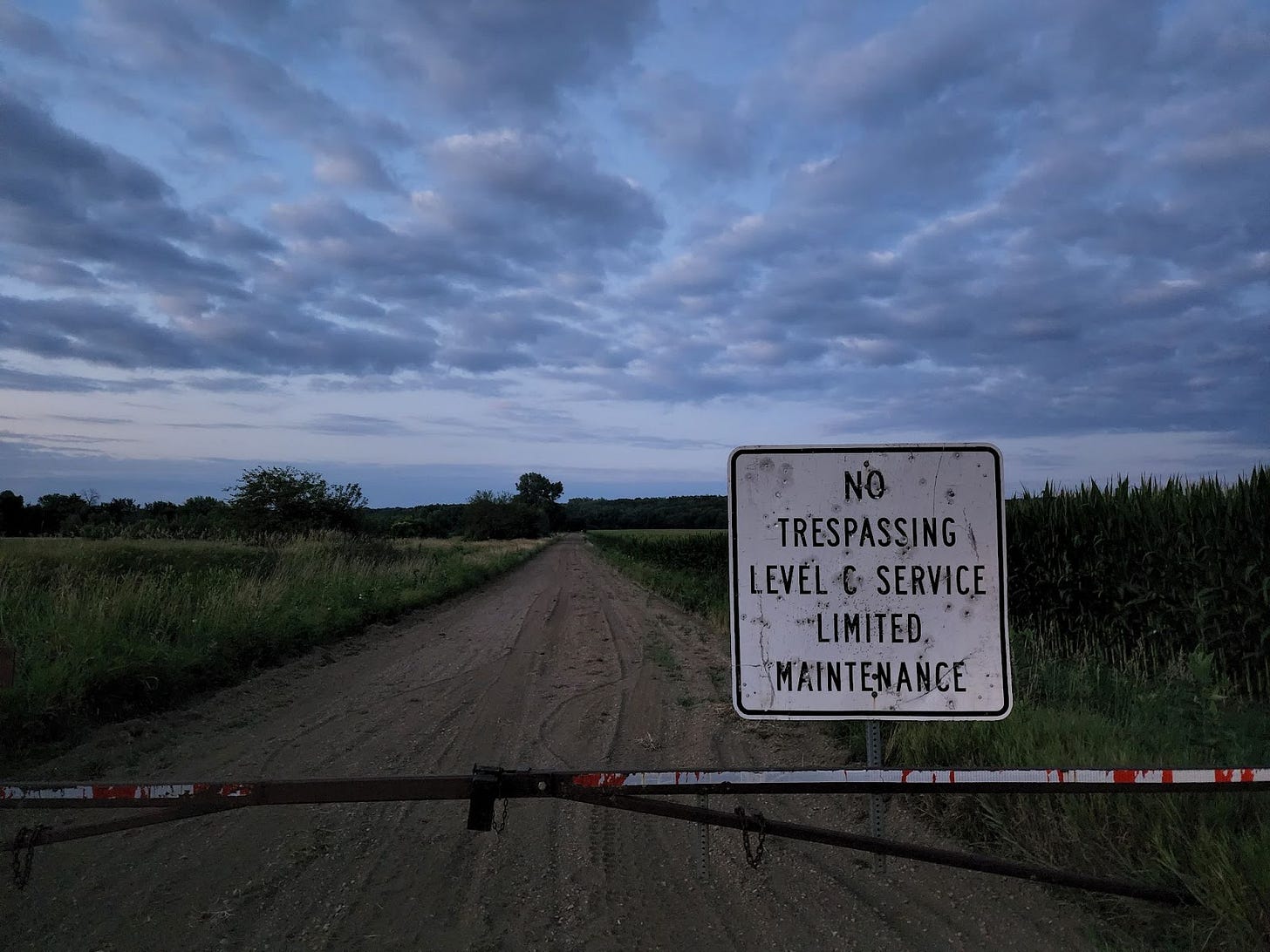Substack 15: Coyote Hunters and Hostages
Violet the dog and I were on our way for our daily walk at Cedar Bluffs Natural Area in Mahaska County shortly before dawn on Saturday when a galloping, panting, pit-bull-looking dog painted with the number 117 on its side darted in front of the truck. I was able to avoid hitting him, and he ran alongside us for a few hundred feet. I pulled into the Cedar Bluffs parking lot and knew our morning walk wasn’t going to happen. Coyote hunters had commandeered the landscape for miles, and I wasn’t going to put Violet at risk. Disappointed, we headed home.
A DNR Press Release from 2017 says they expected about 15,000 coyote hunters in the state that year. According to the DNR, there are few rules for hunting coyotes. They can be hunted year-round, “hunters can use predator calls, hunt day or night, use high powered rifles, may hunt over bait and use groups of hunters and or hounds to round them up.”
Vince Evelsizer, state fur biologist, says pelts go from $15-20 per pelt, depending on quality, and coyote fur is used as trim for hoods and coats in foreign markets.
Elelsizer says, “We receive complaints from the public about coyotes’ impact on young deer, turkeys and rabbits, harass pets, and farmers’ loss of livestock. So in that respect, hunters provide an important service by hunting coyotes.”
I’m sure they receive complaints. The science behind the “important service” is more ambiguous. Some research indicates effects are negligible, and others that if too many are killed off, they breed even more. Others say “indiscriminately killing coyotes is counterproductive and a threat to healthy ecosystems.”
Farmers and ranchers here tell me they believe coyote hunters perform an essential service.
Former moderate Republican Congressman Jim Leach, 80, has switched parties. He’s now a Democrat. He endorsed Christina Bohannan, the Democrat who is running for the First District, which covers much of the same area as the southeastern Iowa district he represented for 30 years, from 1977 to 2007. He has endorsed Bohannan over the Republican incumbent, Mariannett Miller-Meeks.
Concerning Miller-Meeks, Leach offered what I first thought was faint praise. “She's intelligent and not an embarrassment to the state or anything.”
At first glance, “not an embarrassment” seemed like a pretty low bar, but then I realized that so many Republicans in elected offices today are embarrassments; it’s actually an accomplishment. Leach also said Miller-Meeks is a “decent person.” I’ve known and interviewed her for many years, and I think she is a decent person too.
Can you tell when a person is lying to you? Even a “decent” one? Sure you can. I can too. Part of the reason I think Miller-Meeks is a decent person is because when I speak with her, I can see it in her eyes when she is lying, and when she lies, she seems sad. Often someone else is telling her what to say and when she speaks from their script, she knows much of it is wrong.
Joni Ernst too. Joni has the poker face of a Kindergartener, which isn’t necessarily bad. Look her in the eyes, and when she‘s lying, she looks down and away, shuffles a bit, shrinks a smidgen, and changes the subject. But she doesn’t like lying at all but feels compelled to because of the politics of it all. Lying makes her uncomfortable. Visibly so.
I think she’s a good person too, and people who knew her before she went into office tell me she is.
When I was about 20, I read Theodore Dreiser’s great novel, “An American Tragedy.” It was published in 1925. I read it because someone told me that I should read as many great novels as I could before I was 25 because I would be a better person because of it. So I did. The messages in many of those books have stuck with me, but in these times, I often think of this work of Dreiser’s. The protagonist of “An American Tragedy” is a young man who, when confronted with life’s challenges, makes decisions of which several have terrible consequences. As he moves through life, the reader understands why the protagonist made every decision he did, even if we don’t necessarily agree with it. Regardless, by the end of the book, we realize that he has become a terrible person, and by association, intellectually, so has the reader.
When does a “good person” become a “not so good one,” or even a truly bad one?
The last time I spoke to Miller-Meeks, it dawned on me that the look in her eyes was the look of a hostage. Ernst acts like a hostage too. So do many other Republican leaders who fear Trump or what the party will do to them if they turn against him.
Some, like Senator Lindsey Graham, are so far gone that it appears they suffer from Stockholm Syndrome. In this well-known condition, hostages develop a psychological bond with their abusers during captivity. Of course, Graham and many Republicans like him are suffering from a cycle of abuse by Donald Trump.
In another life, as an overnight taxi cab driver in Albuquerque, I saw the pimps and the women who worked with them regularly. I saw the cycle of abuse and reward and the trap it created. Pimps abusing young women just like Trump pimps many of the powerful in the entire Republican party in cycles of abuse and praise.
Some of those Republican leaders are true believers. Others are cynics who will do anything for power. Others are hostages, in cages whose paper mache bars they are afraid to break, even though they could, with enough courage.
Speaking of Lindsey Graham, I’ve interviewed many sweaty politicians over the years. Some of the sweat is normal and expected; the kind we all feel at the Iowa State Fair, or outside summer fundraising events for candidates or local parties, or even in an overheated room in winter.
Lindsey Graham ran for president in 2016. Isn’t the thought of that sooooo ridiculous?
During his Presidential run, I interviewed Graham in the summer of 2015 at the VFW in Knoxville. Graham is a close talker, and as I interviewed him, I noticed that his upper lip had begun to sweat. He wiped it off with a handkerchief, but the volume of water on his upper lip increased until it started to drip and puddle on the floor. If it had gotten any worse, his staff would have had to put a bucket below him.
Steve Bannon, former Trump Chief of Staff, recently found in contempt of Congress, was in Pella in 2011 for the world debut of “The Undefeated,” a hagiographic documentary about Sarah Palin. I interviewed him in a crowded room on the lower floor of the Pella Opera House. He was hunched over in a chair in the corner, back against the wall, furtively looking around, his right knee bouncing nervously. An underling/co-producer sat beside him, a long, tall, pale blonde man who reminded me of a swan.
The underlying would try, on occasion, to say something to me, but Bannon would jerk his head to the side toward him, and his lip would curl--almost into a snarl, and the man would stop.
Bannon sweated even worse than Lindsey Graham. Steve Bannon is a human aquifer.
Now that I think about it, given Bannon’s watery condition, he would be a great roommate for SpongeBob SquarePants in his pineapple under the sea in Bikini Bottom. Squidward and Bannon could be co-workers at the Krusty Krab or in the imaginary Trump White House, take your pick!
Here’s the SpongeBob SquarePants theme song, just because I can! If you are so inclined, grab a crayon and re-write the theme song, putting Bannon in it, and share!
Leach said in support of Bohannan that `this particular year could not be more appropriate for a law school professor to run," referencing the U.S. House select committee investigating the Jan. 6 insurrection. Sure, Bohannan knows the constitution and the rule of law, but do Congressional Republicans care about the constitution and the rule of law anymore? Not so much.
The former Congressman also endorsed Admiral Michael Franken over Senator Charles Grassley. Leach served in the U.S. House of Representatives from 1977 until 2007. Grassley also served in the House from 1975 until 1981, overlapping with Leach, before moving to the Senate.
A friend pointed out that Leach distancing himself from his former colleague Grassley to endorse Michael Franken is of some significance. We’ll see if Franken can use this to his advantage, but in today’s Republican party, who knows if anyone cares?
On June 25, 2010, Republican gubernatorial nominee Terry Branstad announced that Kim Reynolds would be his running mate as his lieutenant governor candidate. I interviewed her a week or two later. At the time, she was unproven in the minds of Iowans, and probably Branstad and his staff. As I sat next to her during the interview, several men stood behind me, where I couldn’t see them. Sometimes she would start answering my question, look up at the men, and then go in a different direction with her answer, manipulated by her handlers.
I think Governor Reynolds has grown well beyond her handlers into a powerful political force. She’s been hardened by leading during the pandemic and has been thrust onto the national stage. While it doesn’t look like it, her skin must be as thick as an elephant’s. She isn’t the best speaker in public but does fine one-on-one.
She doesn’t have many stock answers and often thinks for a moment before answering questions, suggesting she isn’t scripted. Kim Reynolds is no hostage.
Since I met the coyote hunters at Cedar Bluff Natural Area on Saturday, I figured I would give them some space in case they were back Sunday morning. It also seemed wise to find a new place to walk. Not far from home is a county road that you see above. I decided to walk it. Yes, I know the sign says no trespassing. I don’t care. Arrest me.
It’s public land, and I’m going to use it. Locals will know where I am talking about.
When I lived on the Pueblo of Zuni in New Mexico in the 1980s and ’90s, I knew old Zuni men who walked everywhere across the landscape with wirecutters, so they could cut fences whenever they encountered them. They believed fences were wrong because no one can own the earth, as it is for us all, and I get my inspiration from these powerful men.
I’m glad I walked down this road and into the timber by the North Cedar River. It was beautiful. Here are a couple of photos I took.
And with that, I’ll close with a few recommendations.
Anyone interested in the current status of higher education and more, I suggest you let my friend Josh Dolezal welcome you into his world with The Recovering Academic. Josh is a splendid storyteller, and his stories are thick with meaning and insights.
Check out Julie Gammack’s Iowa Potluck and The Iowa Writers Collaborative, and look for a group of writers who are Iowa treasures to join us soon.
And speaking of Iowa treasures, please follow the writings of my friend Rachelle Chase and her work for the Des Moines Register. Rachelle’s columns and videos are wonderful and thought-provoking. Well written and executed, insightful; sometimes critical, but never off-putting, her stories are inclusive and always engaging. And kind. Always kind.
While Rachelle writes about many topics, her writing about her fellow Black Iowans and other minorities is a special gift to us all. She has opened my eyes to so many things I simply never saw, never had an invitation to, or didn't know existed. Given voice by the Register, her work is changing the face of Iowa by showing us what was already here but many of us never knew existed.
She's an Iowa treasure, for sure.







